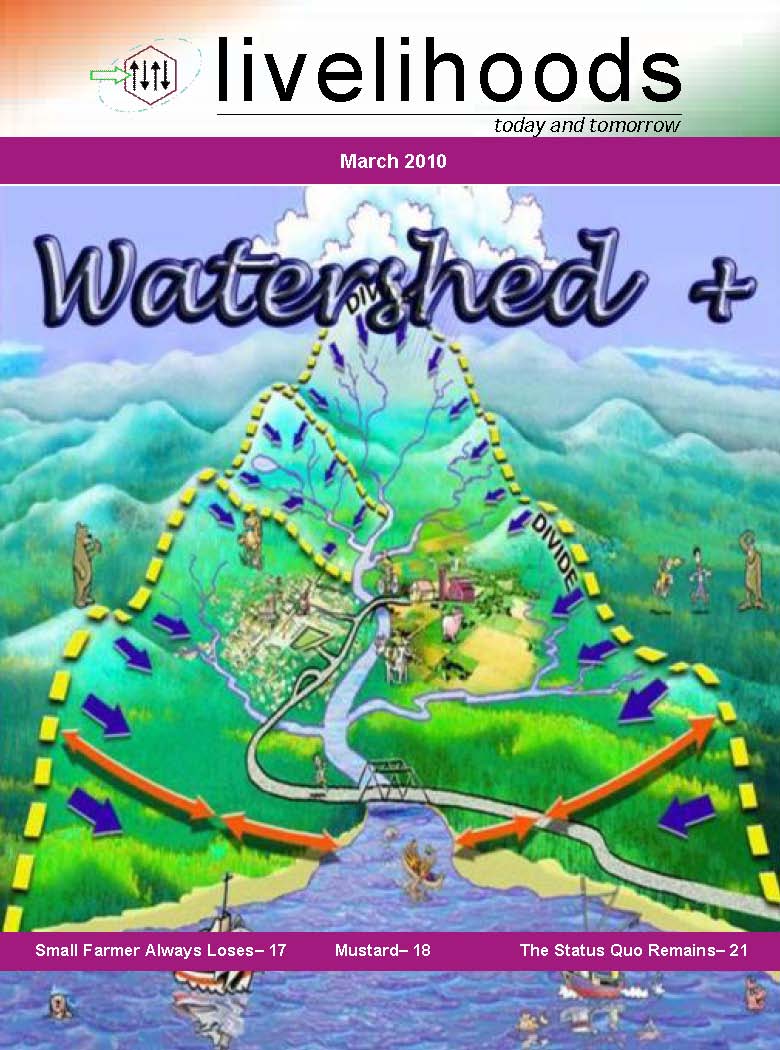/topics/informal-sector-0
Informal Sector
"Gujarat farmers fight against climate change: Adopt technoloxxgy to conserve resources and maximize benefits" : News roundup (15-21 October 2010)
Posted on 22 Oct, 2010 11:25 AMClimate Change
Internship opportunity in Tamil Nadu with Leaf Society
Posted on 30 Sep, 2010 03:09 PM
We are one of the fastest growing grassroots’ NGO working to promote safe sanitation & drinking water practices among rural & tribal communities of a district in Tamilnadu.
Draft paper on 'Monitoring Compliance of Environment / CRZ clearance conditions A New Approach'
Posted on 16 Sep, 2010 03:26 PM
Please consider signing this online petition drafted by the Environmental Support Group, who have been AID's partner for 10 years now (esgindia.org). This letter is regarding a 'Draft Paper' on 'Monitoring Compliance of Environment/CRZ clearance Conditions – A New Approach' drafted by an in-house Review Committee constituted on 25th August 2010 by the Ministry of Environment and Forests.
Energy supply and the expansion of groundwater irrigation in the Indus-Ganges Basin - A working paper by Challenge Program on Water and Food
Posted on 22 Aug, 2010 08:27 PMThe paper by International Water Management Institute (IWMI), Challenge Programme for Water and Food (CPWF) and University of Arizona deals with energy supply and expansion of groundwater irrigation in the Indus-Ganges basin. Irrigation using groundwater has expanded rapidly in South Asia since the inception of the Green Revolution in the 1970s and it represents the largest source of irrigation in the basin.
Second press release from Water Initiatives Orissa on the myth of Surplus Water in Orissa
Posted on 11 Aug, 2010 01:46 PM
- WIO demands the Government of Orissa to come out with a White Paper on water first and then decide on new allocations.
- No new industries should be allowed to draw water unless this White Paper prepared and made public.
- That Orissa is a ‘Surplus Water’ state is a ‘myth’.
Decentralisation and water resources management in the Indian Himalayas: The contribution of new institutional theories - Conservation and Society paper
Posted on 02 Aug, 2010 01:31 AMThis paper discusses the relevance of the process of decentralisation in water resources management. The paper argues that decentralisation is not about formulating a top-down reform package to transfer power from central government to other actors to manage water resources, nor is it about emphasising the existence of the bottom up agency.
Rather, the paper draws on "New Institutionalism" and argues that decentralisation is a complex adaptive process that involves natural as well as political actions of actors and agents who draw on existing structures to negotiate and renegotiate the existing unequal power relations to manage water.
Water sector and reforms - Report of workshop organised by CASUMM (2007)
Posted on 02 Aug, 2010 12:08 AMThe workshop was organised in response to the implementation of two water supply projects in Bangalore and Mysore as a part of the Water Sector Reforms under the Jawaharlal Nehru National Urban Renewal Mission (JNNURM) and the increasing trend of privatisation under the water sector reforms in cities like Bangalore and Mysore.
It was felt that there was a need to raise awareness among citizens and groups in Bangalore and Mysore regarding the implications of privatisation and the mechanisms through which privatisation was being introduced in the cities in India.
Synergos Fellowship for NGOs working for the Poor
Posted on 21 Jul, 2010 10:43 AMImage and Content Courtesy: Synergos
The Senior Fellows Network is comprised of distinguished international civil society leaders committed to collaborative efforts that address the underlying causes of poverty and inequity.
Livelihoods magazine special issue on watersheds
Posted on 07 Jun, 2010 08:14 AM A special issue of the Livelihoods magazine (March 2010) brought out by the Akshara Network for Development Support Services, on Watersheds+.
A special issue of the Livelihoods magazine (March 2010) brought out by the Akshara Network for Development Support Services, on Watersheds+.
Increasing productivity of dry lands is possible through soil and moisture conservation (SMC) efforts results in growth led by increases in the farm output. Separate efforts are required to include the land-less and the vulnerable in this growth, so that they also realize the benefits of improved food security, increased employment and diversification of livelihoods. Such activities are known as ‘Watershed Plus’ interventions, and ‘livelihoods’ explores these activities.
Urban Development Policy 2009 - Department of Urban Development (Government of Karnataka)
Posted on 05 Jun, 2010 04:20 PMThe Urban Development Policy, Karnataka has been developed, by the Department of Urban Development (Government of Karnataka), as a response to the challenges that are being faced by the state due to rapid urbanisation leading to:
- An increase in population in urban areas due to migration
- Increase in the number of poor residents in urban areas
- Infrastructural shortfall on several fronts
- Shortage of resources
- The challenge of ensuring the basic welfare of the poor in urban areas
- The increasing need for strengthening governance, planning and administration





